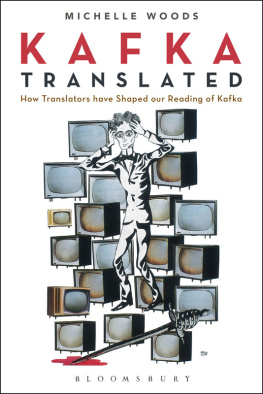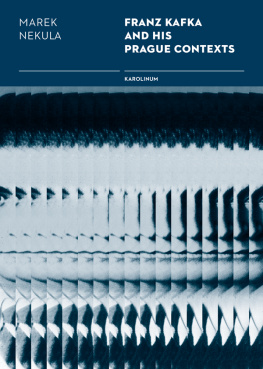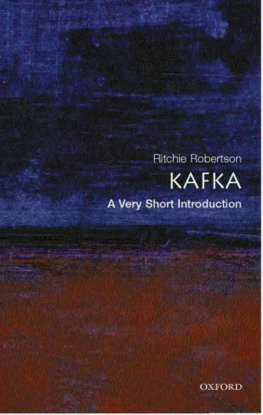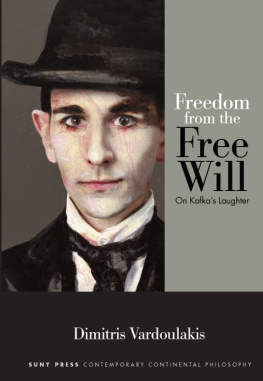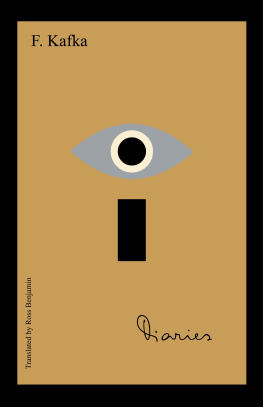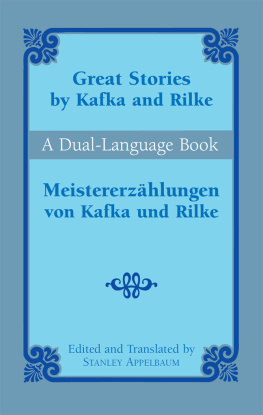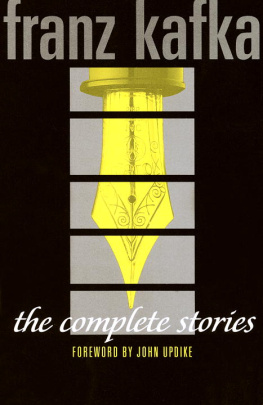MERIDIAN
Crossing Aesthetics
Werner Hamacher
Editor
THE YIELD
Kafkas Atheological Reformation
Paul North
Stanford University Press
Stanford, California
2015
Stanford University Press
Stanford, California
2015 by the Board of Trustees of the Leland Stanford Junior University. All rights reserved.
reprinted by permission of the publishers and the Trustees of Amherst College from The Poems Of Emily Dickinson: Variorum Edition, edited by Ralph W. Franklin, Cambridge, Mass.: The Belknap Press of Harvard University Press, Copyright 1998 by the President and Fellows of Harvard College. Copyright 1951, 1955 by the President and Fellows of Harvard College. Copyright renewed 1979, 1983 by the President and Fellows of Harvard College. Copyright 1914, 1918, 1919, 1924, 1929, 1930, 1932, 1935, 1937, 1942 by Martha Dickinson Bianchi. Copyright 1952, 1957, 1958, 1963, 1965 by Mary L. Hampson.
No part of this book may be reproduced or transmitted in any form or by any means, electronic or mechanical, including photocopying and recording, or in any information storage or retrieval system without the prior written permission of Stanford University Press.
Printed in the United States of America on acid-free, archival-quality paper
Library of Congress Cataloging-in-Publication Data
North, Paul, 1971 author.
The yield : Kafkas atheological reformation / Paul North.
pages cm
Includes bibliographical references.
ISBN 978-0-8047-9445-9 (cloth : alk. paper)
ISBN 978-0-8047-9659-0 (pbk. : alk. paper)
1. Kafka, Franz, 18831924Philosophy. 2. Philosophical theology. I. Title.
PT2621.A26Z8114 2015
833'.912dc23
2015007376
ISBN 978-0-8047-9669-9 (electronic)
for caro
He strained my faith
Did he find it supple?
Shook my strong trust
Did it thenyield?
Emily Dickinson
Contents
Conversations
Id like to thank Jeffrey Cassvans father, whom I havent met. If he hadnt handed Jeff a volume of Kafka with the nerve that only a parent has vis--vis a child to transmit the most vexed and troublesome gifts, and if Jeff had not been daring enough to whisper Kafka to me one night on the street in Queens in a tone reserved for a god no one remembered, I would never have started reading. I would never have started thinking had I not found myself in a seminar on Kafka and Nietzsche taught by Peter Fenves at Northwestern University in 2003. My engagement with Kafka continues to be driven by the dialectic laid out there. Some of this book is Peters ground; I hope to have planted a few creepers in it. In the summer of 2012, Werner Hamacher got up from his table in Frankfurt and disappeared into his labyrinthine library. He returned, face shining, with the passage on the illuminated corpse from a letter by Kafka. Our subsequent dialogue about Rosenzweigs nothing and its basis in Cohens Infinitesimallehre added themselves to the continuous seminar that Hamacher has been holding in my thoughts for many years. I am thankful for his mentorship and his remarkable essays. The book also benefited greatly from his proposals. I am grateful as always for the ongoing intellectual agon with Anthony Adler, from whom in our cantankerous exchanges I keep experiencing what thinking can possibly be. He read parts of the book with the courage he always has to point out the broadest conceptual frame. Around Rdiger Campe and his students at Yale an international Kafka workshop formed that raised crucial questions about the structure of address in Kafkas writings. I am also obliged to Rdiger for his patient responses to my speculations at lunches in New Haven. Thanks to the faculty of the Yale German Department for their support and to a Morse Junior Faculty Grant from Yale for the time to write. Parts of the book were presented at the Yale Whitney Humanities Center, Tufts University, the University of Zrich, and the University of Tel Aviv. Gratitude is owing to Margaret Czepiel of the Bodleian Library at Oxford for facilitating work with the manuscripts and to Hans-Gerd Koch for sharing a draft of the 191820 volume of Kafkas Briefe before funds were found to publish it. Finally, a host of encounters and exchanges with some of the most interesting people on the planet brought many thoughts to formulation and many to the scrap heap. I am profoundly beholden to Carolina Baffi, Andrew Libby, Eyal Peretz, Yue Zhuo, Roshen Hendrickson, Demetra Kasimis, Friese Undine, Anna Glazova, John Whalen, Katrin Trstedt, Paul Grimstad, Carol Jacobs, Michael Levine, Henry Sussman, Thomas Schestag, Jacques Lezra, Paul Fleming, Kirk Wetters, Vivian Liska, Avital Ronell, Hindy Najman, Eckart Goebel, Rainer Ngele, Michel Chaouli, Paul Franks, and Liliane Weissberg for the generous exchange of so many sentences. Thomas Stachels careful and precise editing of translations and his fact-checking for the final revision were invaluable. The final revision happened within the penumbra of David Farrell Krell, who read the manuscript afternoons on a Greek isle and gave it the kind of epimethean shock treatment without which such a promethean venture would surely not have survived. He noticed that the pivot point of my argument and Kafkas movement of thought was, whether I knew it or not, the concept of eternal recurrence, and this enabled me suddenly to see the book as it should have been. You will, however, read the present version of it, in which I have only briefly sketched out this relation. The real book will come in the next revision, the one after this one, the one after the last
Preface
To understand how Kafka, working through some theological issues, came to a peculiar conclusion about the good, the true, and the being-ground of everything, you will first, I think, have to accept a peculiar idea. You will have to be willing to accept a replete universe, everything together at once in a cosmos in which there is absolutely no room to breathe or move or change, no chance to be anything other than you are at this very instant. Such a universe is saturated with itself, chaotic maybe, but still all is there, filling every corner. This peculiar idea has serious repercussions: the only creation in this kind of universe is decreation, the only possible addition is subtraction, the only movement is pause, the only freedom is a species of bondage, and, yes, the only production is the production of inequality. This last corollary will take some time to explain.
Who would desire such a universe? No one would like to live there, or even be able to imagine it: everything packed into the pleroma that no one can see. Inside it, an entity or an event only happens when someone or something steps back, makes room. Making room is the only real act in such a cosmos.
A minor motif in Genesis, a tale ancillary to the story of creation but important for it too, may make this packed universe seem less peculiar an idea. It is a motif of making room, of yielding. The motif is remarkably consistent across the P and J sources for Genesis. It appears at three pivotal moments: the Garden of Eden, the forming of Adam, and the initial gestures of creation. Reading backward, God planted a garden (Gen. 2:8), God formed human being from earth (2:7), and God began to create the all (1:1). Reading forward, creation happens to an unformed earth. The earth brings forth vegetation (1:11, 1:12). Soon all living creatures emerge from it (1:24). Then the human being is formed out of earth, a geolassic creature before it is a pneumomorphic one. God needs earth. Why? The earth lets him do what he wants to do; it has give. The same give of the earth makes for the creation of the world, the creation of the model human, and the creation of the Garden, and in the Garden, also by grace of earth, come all the growths and especially the two trees, of life and of moral judgment.
Next page

